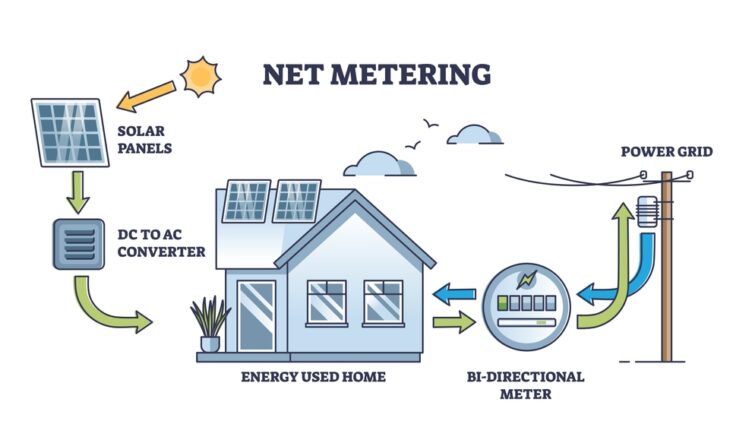Net metering enables consumers to produce their own electricity from renewable sources like solar power, representing an innovative system. It enables homeowners and businesses to reduce their electricity bills by selling excess power back to the grid. This article will provide a comprehensive, step-by-step guide to understanding and implementing net metering in Pakistan.
Importance of Net Metering in Pakistan
With the rising cost of electricity and frequent power outages, net metering offers a sustainable and cost-effective solution. It encourages the use of renewable energy, reduces the dependency on the national grid, and promotes environmental sustainability.
How Does Net Metering Work?
Net metering in Pakistan operates on a simple principle. When your solar panels generate more electricity than you use, the excess power is sent to the national grid. Your electricity meter runs backward, giving you credit for the surplus energy. When your panels are not generating enough electricity, you can draw power from the grid, and your meter runs forward.
Steps to Implement Net Metering in Pakistan
-
Design the Solar System
Work with your installer to design a solar system that meets your energy needs. The design should consider factors like roof space, orientation, and shading. -
Obtain Necessary Approvals
Before installing the system, you need to obtain approvals from relevant authorities. This includes getting a no-objection certificate (NOC) from your local electricity distribution company. -
Install the Solar Panels
Once you have all the necessary approvals, your installer will set up the solar panels on your property. Ensure that the installation is done as per the safety and quality standards. -
Connect to the Grid
After installation, your system needs to be connected to the national grid. Your installer will handle the connection process, including the installation of a bi-directional meter. -
Inspection and Testing
The installed system will be inspected and tested by the electricity distribution company. They will verify that the system complies with technical and safety standards.
Benefits of Net Metering in Pakistan
-
Cost Savings
Net metering can significantly reduce your electricity bills. By generating your own power, you decrease your reliance on the national grid. -
Energy Independence
Generating your own electricity provides energy independence. You are less affected by power outages and fluctuations in electricity prices.
Challenges of Net Metering in Pakistan
-
Technical Issues
Proper installation and maintenance are crucial. Technical issues can affect the efficiency and performance of your system. -
Regulatory Hurdles
Navigating the regulatory requirements can be challenging. It is essential to stay updated with the latest policies and regulations.
Understanding the Net Metering Policy in Pakistan
Pakistan’s net metering policy is governed by the National Electric Power Regulatory Authority (NEPRA). The policy allows consumers to install renewable energy systems up to 1 MW capacity and sell excess electricity to the grid. Here are some key points:
-
Tariffs: Consumers are credited at the same rate they are charged for electricity.
-
Contract Duration: Net metering agreements are typically valid for up to 25 years.
-
Metering Equipment: A bi-directional meter is required to measure the electricity exported and imported.
Financial Incentives and Support
To promote net metering, the government offers various incentives and support programs. These include:
-
Subsidies and Grants
Some provincial governments provide subsidies and grants for the installation of solar systems. -
Tax Incentives
Tax incentives are available for renewable energy investments. This includes exemptions on import duties for solar equipment. -
Financing Options
Several banks and financial institutions offer loans at reduced interest rates for solar installations.
Future of Net Metering in Pakistan
The future of net metering in Pakistan looks promising. With the increasing focus on renewable energy and the government’s supportive policies, more consumers are expected to adopt net metering. Advances in technology and decreasing costs of solar panels will further drive the growth of net metering.
Discover how DSG Energy is leading the charge in revolutionizing Pakistan’s energy sector with state-of-the-art Grid Tied Solar System installations. By promoting the use of renewable resources like Net Metering in Pakistan, DSG Energy aims to enhance energy efficiency and reduce dependency on traditional energy sources. Join us in creating a sustainable future with Net Metering solutions that not only lower electricity bills but also contribute to a cleaner environment and greater energy independence.
Conclusion
Net metering in Pakistan offers a sustainable and cost-effective solution to the energy challenges faced by the country. By generating your own electricity, you can reduce your electricity bills, contribute to a cleaner environment, and gain energy independence. Follow this step-by-step guide to successfully implement net metering and enjoy the numerous benefits it offers.
By understanding the process and requirements, you can make an informed decision and take advantage of the opportunities provided by net metering in Pakistan. Start your journey towards a sustainable and energy-efficient future today!

